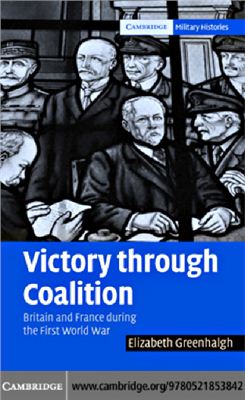Cambridge : Cambridge University Press, 2005. - 304 p.
Germanys invasion of France in August 1914 represented a threat to the great power status of both Britain and France. The countries had no history of cooperation, yet the entente they had created in 1904 proceeded by trial and error, via recriminations, to win a war of unprecedented scale and ferocity. Elizabeth Greenhalgh examines the huge problem of finding a suitable command relationship in the field and in the two capitals. She details the civil-military relations on each side, the political and military relations between the two powers, the maritime and industrial collaboration that were indispensable to an industrialised war effort and the Allied prosecution of war on the weste front. Although it was not until 1918 that many of the war-winning expedients were adopted, Dr Greenhalgh shows that victory was ultimately achieved because of, rather than in spite of, coalition.
Germanys invasion of France in August 1914 represented a threat to the great power status of both Britain and France. The countries had no history of cooperation, yet the entente they had created in 1904 proceeded by trial and error, via recriminations, to win a war of unprecedented scale and ferocity. Elizabeth Greenhalgh examines the huge problem of finding a suitable command relationship in the field and in the two capitals. She details the civil-military relations on each side, the political and military relations between the two powers, the maritime and industrial collaboration that were indispensable to an industrialised war effort and the Allied prosecution of war on the weste front. Although it was not until 1918 that many of the war-winning expedients were adopted, Dr Greenhalgh shows that victory was ultimately achieved because of, rather than in spite of, coalition.

